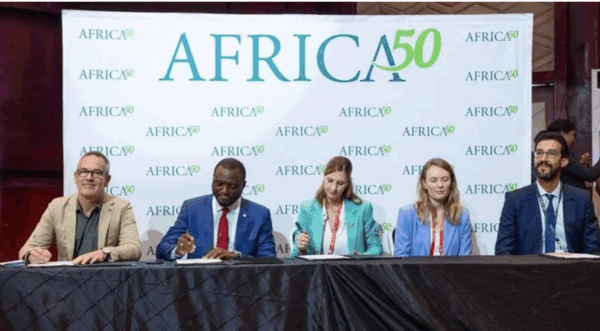Maputo, Mozambique – August 13, 2025 – Africa50, a pan-African infrastructure investor and asset manager, announced the first closing of the Alliance for Green Infrastructure in Africa Project Development Fund (AGIA-PD) at $118 million. This milestone marks a significant step in implementing climate-resilient and low-carbon infrastructure projects across the continent. The fund, managed by Africa50, aims to mobilize up to $400 million of mixed capital to finance the upstream development of transformative projects in strategic sectors: renewable energy, sustainable transport, water, and ICT. Launched at COP27 with the support of the African Development Bank (AfDB) and the African Union Commission, the AGIA initiative aims to generate up to $10 billion of investment opportunities for the private sector in the long term.
The first closing brought together a consortium of leading donors: the African Development Bank ($40 million in grants, quasi-equity, and commercial capital), German cooperation through KfW (€26 million), the West African Development Bank (BOAD), the UK’s Foreign, Commonwealth & Development Office (FCDO), the Soros Economic Development Fund, and the African Climate Foundation. “This operation is not just about providing capital, it reflects AfDB’s willingness to share risks with its partners to unlock the potential of African green infrastructure,” said Solomon Quaynor, AfDB Vice President.
Meanwhile, Alain Ebobissé, CEO of Africa50, emphasized: “Since its launch in Charm el-Cheikh, AGIA has moved from ambition to execution. This first closing demonstrates investor confidence and represents a decisive step towards building a strong portfolio of bankable projects.” The fund stands out for its inclusive approach: it will support both established developers and new local players, thereby strengthening African capacity in sustainable project development. For Serge Ekué, BOAD President, “this commitment illustrates our determination to bridge the infrastructure gap in Africa and stimulate private investment within the WAEMU and beyond.”
International partners also applaud this momentum. UK Development Minister Jenny Chapman stressed “the importance of supporting locally-led African projects, such as solar power plants and water treatment facilities,” while Soros Economic Development Fund CEO Georgia Levenson Keohane mentioned “a crucial step to accelerate a just and inclusive energy transition.”
By addressing the main barrier – the lack of bankable projects – AGIA-PD emerges as a catalyst for private capital in the continent’s energy transition and climate adaptation.


